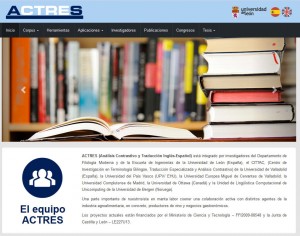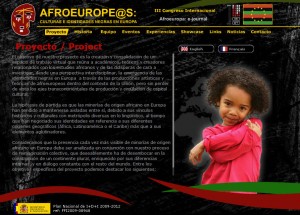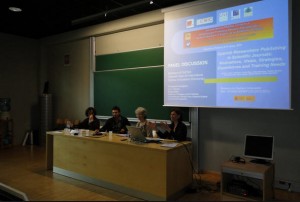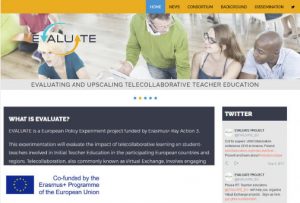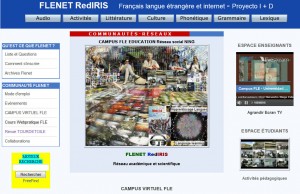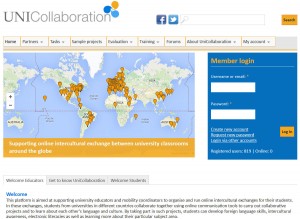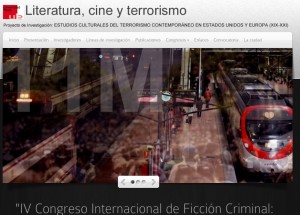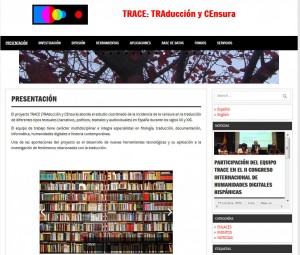PROYECTOS DE INVESTIGACION
ACTRES Análisis Contrastivo y Traducción Inglés-Español
Objetivos principales del proyecto: 1.Llevar a cabo análisis contrastivos inglés-español de tipo léxico-gramatical, fraseológico y retórico. 2. Estudiar aspectos de la lengua traducida en contraposición con textos originales escritos en la misma lengua. 3. El diseño y construcción de herramientas tales como corpus, etiquetadores, visores, captadores de combinaciones de palabras, etc. con el fin de facilitar el estudio de tipos textuales específicos. 4. Desarrollar: – Aplicaciones informáticas de ayuda a la escritura para usuarios no lingüistas de habla castellana en diferentes campos profesionales y contextos. – Herramientas para la evaluación de la calidad gramatical de textos traducidos – Dispositivos de escritura bidireccional, ayudas lexicográficas y otros tipos de ayudas de comunicación dirigidas a mejorar la internacionalización y la comercialización de productos y servicios Las herramientas y aplicaciones que se van produciendo están dirigidas a una amplia variedad de usuarios, tales como profesionales de distintos campos sin conocimientos lingüísticos, proveedores de servicios lingüísticos, profesores, investigadores, estudiantes y cualquier tipo de profesionales que trabajen con el par de lenguas inglés-español.
AFROEUROPE@S Culturas e identidades negras en Europa
Afroeurope@ns: Black Cultures and Identities in Europe is a network connecting academics, artists, and cultural workers committed to the study of black cultures across different European countries and institutions. The comparative study of the theory, literature and arts produced by African Europeans in the last decades is aimed to explore both the cultural specificities and the internal diversity of black communities in Europe, as well as their connections with the Black Atlantic as a whole. Linguistic barriers within our continent, inherited by immigrants arrived from post-colonial contexts, have prevented until now the fluid exchange of information between African Europeans and Africanists working in different languages. One of the main objectives of this project is to create and develop a virtual workspace, shared by theorists and artists working in Spanish, French, Portuguese and English, that may help overcome this situation. Cultural studies and debates over multiculturalism in contexts different from the European such as Australia, Canada and the USA, but also in Europe, and particularly in Great Britain, have brought to the forefront the essential role of culture (music, literature, cinema, the plastic arts and so on) in the processes of creation and negotiation of collective identities. The creation of a formal network of relations between Africanists and African Europeans working in different countries and languages is a decisive step towards the configuration of a tolerant and plural European identity, respectful of diversity.
ENEIDA Spanish Team for Intercultural Studies on Academic Discourse
The project focusses on a neglected population of EAL writers, Spanish researchers, and advocates for a critical pragmatic approach that addresses access and difference simultaneously. Thus the project highlights the importance of giving priority to those aspects of ERPP writing with which specific groups of Spanish researchers tend to have difficulties when communicating with an international audience (the intercultural perspective). Additionally, based on revealing results from Spanish-English crosscultural studies of academic discourse, the project seeks to explain some of Spanish researchers’ writing problems by virtue of the contrastive rhetoric hypothesis, according to which writers from different cultural and language backgrounds have distinct preferences for articulating messages with share a similar purpose (the crosscultural perspective). The team’s first joint research project is entitled Rhetorical Strategies to Get Published in International Scientific Journals from a Spanish-English Intercultural Perspective.
EVALUATE Evaluating and upscaling telecollaborative teacher education
EVALUATE is a European Policy Experiment project funded by Erasmus Key Action 3. This experimentation will evaluate the impact of telecollaborative learning on student-teachers involved in Initial Teacher Education in the participating European countries and regions. Telecollaboration, also commonly known as Virtual Exchange, involves engaging trainee teachers involved in Initial Teacher Education in task-based interaction and collaborative exchange with fellow trainees in other locations through online communication technologies. The guiding research question for the study is: “Will participation in telecollaborative exchange contribute to the development of competences which future teachers need to teach, collaborate and innovate effectively in a digitalised and cosmopolitan world?”
Projet FLENET – Campus Virtuel FLE
FLENET: Français langue étrangère et Internet est un projet de recherche sur les applications pédagogiques des nouvelles technologies de l’information et de la communication (NTIC) dans le domaine du français langue étrangère (FLE). Le but du projet est de fournir aux étudiants, aux enseignants et aux chercheurs de FLE les ressources, les méthodes et les outils nécessaires pour l’intégration d’Internet dans le terrain de l’enseignement / apprentissage du FLE. Voici ses principaux objectifs: 1. Elaborer des ressources, máteriels didactiques et base de données pour la recherche et l’enseignement du français langue étrangère à l’aide des nouvelles technologies. 2. Proposer des méthodes et des outils pour l’évaluation des ressources FLE sur Internet. 3. Créer des activités et des tâches pédagogiques pour les étudiants de français langue étrangère (enseignement universitaire et autres). 4. Proposer un espace d’échange et de communication pour les étudiants, les enseignants et les chercheurs de la communauté scientifique du FLE.
INTENT Project – UNICollaboration
The INTENT project was awarded funding by the European Commission’s Lifelong Learning programme to carry out a 30-month project. The team established two key aims for their project: 1. To raise greater awareness among students, educators and (senior) managers at university level of OIE as a pedagogical model serving the goal of virtual mobility in foreign language education. 2. To achieve more effective integration of OIE in university institutions. These aims address the main obstacles to achieving virtual mobility – first, the lack of awareness among educators about this activity and how it can be organised, and second, the need to provide practitioners with the tools, training and support necessary to make the activity as effective as possible. These aims can be broken down into the following objectives: 1. Establish a clear overview of the levels of use of OIE, explore attitudes to the activity among key stakeholders across European HEIs, and identify practical barriers to the adoption of OIE activities. 2. Develop a set of tools, telecollaborative models and partner networks to overcome barriers and facilitate OIE practice. 3. Develop a set of workable solutions to address the current lack of academic recognition for participation in OIE activity. 4. Publish an online training manual and hold training workshops to inform and support the FL teaching and learning community as well as related stakeholders and decision makers. 5. Engage decision makers at institutional, regional and national levels in a collaborative dialogue as to how telecollaboration can be effectively employed as a tool for the achievement of the Bologna process.
Estudios culturales de terrorismo contemporáneo
El fenómeno del terrorismo ha figurado frecuentemente en las diferentes manifestaciones artísticas cuyas formas de expresión constituyen el paradigma del impacto que esta práctica de la violencia ha provocado en la construcción de un determinado imaginario cultural. Desde el origen del “terrorismo moderno” en el siglo XIX, la ficción ha representado, a través de una retórica figurativa en continua evolución, los discursos ideológicos que han predominado en los diferentes periodos en que estos acontecimientos han tenido una mayor presencia. Walter Laqueur, uno de los expertos más reconocidos en el estudio de la historia del terrorismo, en su obra The Age of Terrorism publicada en 2003, afirma que “La ficción resulta más prometedora para la comprensión del fenómeno terrorista que la ciencia política… El terrorismo ha figurado prominentemente en obras de la literatura moderna” pero “la literatura como fuente para el estudio del terrorismo es aún terra incognita”. Si bien la literatura se ha ocupado de representar este fenómeno en diferentes épocas y países, el estudio de la representación del terrorismo en el discurso literario y en otros discursos (cine, medios de comunicación) está prácticamente inexplorado. Para poder obtener una visión de conjunto de la evolución de esta narrativa hemos emprendido la elaboración de una Enciclopedia histórica del terrorismo en la literatura y las artes escénicas, un trabajo de investigación ambicioso, que pretende ser una obra de referencia para trabajos posteriores, especialmente aquellos dirigidos a los estudios comparados.
TRACE TRAducción y CEnsura
El proyecto TRACE (TRAducción y CEnsura) aborda el estudio coordinado de la incidencia de la censura en la traducción de diferentes tipos textuales (narrativos, poéticos, teatrales y audiovisuales) en España durante los siglos XX y XXI. Los objetivos principales son: Describir las condiciones de trasvase de diferentes tipos de textos durante el siglo XX español en base a los análisis de distintos corpus paralelos de textos originales y sus respectivas traducciones. Constatar si las pautas de transferencia intercultural se vieron afectadas de algún modo por los condicionantes ideológicos vigentes en el contexto meta y si, caso de suceder, los resultados son extrapolables a algún otro contexto ideológicamente marcado o si, por el contrario, tal situación no es determinante. Verificar si las prácticas traductoras de ese periodo han tenido una influencia en la producción textual española posterior, en las expectativas de recepción de los textos importados y en los usos lingüísticos tanto nativos como traducidos.




